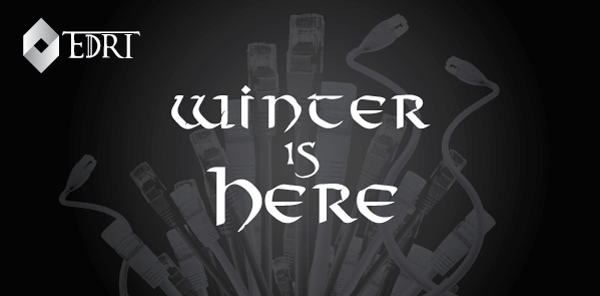Winter is here
This autumn announces itself much colder and threatening for our rights and freedoms than we thought: The e-Privacy Regulation and copyright reform are the two main pieces of EU legislation that will keep the digital rights defenders of EDRi’s Brussels office busy. We will also continue our work on implementation of the General Data Protection Regulation (GDPR), the Audiovisual Media Services Directive (AVMSD), encryption, cross-border access to electronic evidence, and intermediary liability, among other dossiers.
e-Privacy
In January 2017, the European Commission published its proposal for an e-Privacy Regulation (ePR), which will cover privacy and data protection issues specific to electronic communications. Our longer position paper and quick guide provide an introduction to the most important points of the proposal. The next steps with this dossier will be the key votes in the European Parliament (EP). Some Committees are scheduled to vote on an Opinion in late September, and the lead Committee (Civil Liberties, Justice and Home Affairs, LIBE) is likely to vote on its final Report in October. The good news is that the LIBE draft Report already contains a number of amendments to the original Commission text that are in line with our suggestions. After the LIBE vote, the text is likely to go through “trilogues”, which are informal negotiations between the Council of the European Union, the European Parliament and the Commission. The text will then be adopted in the Parliament’s Plenary session. This is likely to happen at the earliest in spring 2018.
Copyright reform
In September 2016, The European Commission published its proposal for a new Copyright Directive that aims at modernising EU copyright rules. The proposal poses a number of threats to our online freedoms, of which the most distressing is the introduction of a “censorship machine”, which would filter all uploads to the internet (Article 13 of the proposal) in contradiction to at least four European court rulings and existing EU secondary law. Another paragraph introduces the so-called “link tax” (Article 11), which has already been an expensive failure in Germany and Spain. In addition to our continuous efforts to convince the politicians to abandon the most damaging points of the proposal, we are also meeting and exchanging with activists around Europe to increase cooperation. Our event, the “School of Rock(ing) Copyright” will take place in September in Ljubljana, and in October in Budapest and in Lisbon.
General Data Protection Regulation (GDPR)
The General Data Protection Regulation (GDPR), the main text of EU legislation dealing with the protection of personal data, was finalised in 2016. However, because of the numerous, unpredictable flexibilities in the legislation, our work is not over yet. We are working together with many EDRi members, the European Consumer Organisation (BEUC) and academics, to promote the best possible implementation of the GDPR. We will be working on a “compliance check list for users”, general research about the effects of the Regulation, and technical tools to help citizens to exercise their rights.
E-evidence and cybercrime
The European Commission is preparing to present plans on dealing with access to electronic evidence (“e-evidence”). In addition, an optional protocol to the Cybercrime Convention (also known as “the Budapest Convention”) is currently being prepared, to be finalised by the end of 2019. We will be following the process closely, and sending submissions to the Council of Europe (CoE) to ensure that our rights and freedoms are considered in the final protocol. The first meeting of the drafting group will take place on 19-20 September 2017.
Audiovisual Media Services Directive (AVMSD)
In May 2016, the European Commission proposed to reform the Audiovisual Media Services Directive (AVMSD). The current AVMS Directive regulates traditional TV broadcasters and on-demand services in the EU. The new proposal broadens the scope of the Directive to cover the regulation of video-sharing platforms and potentially even other social media companies. Our main concern is the lack of clarity and safeguards for respecting the rule of law and protecting fundamental rights. The trilogue negotiations on the proposal have now started, following a vote in favour by 17 (in the Committee that took the decision) of the 751 Members of the European Parliament (adopting the Parliament’s negotiating position) and none of the EU Member States (adopting the negotiating position of the Council of the European Union). A few policy-makers will continue with the aim of reaching a political agreement by the end of the year. EDRi will issue recommendations and try to obtain improvements in the opaque process.
In addition to the priorities listed above, we will also be working on other topics, such as Notice and Action, digital trade, a Fundamental Rights Review Project on surveillance instruments, and following developments on net neutrality and whistleblowing protection.

e-Privacy revision: Document pool
https://edri.org/eprivacy-directive-document-pool/
Copyright reform: Document pool
https://edri.org/copyright-reform-document-pool/
The School of Rock(ing) EU Copyright 2017
https://edri.org/sorc2017/
Proceed with caution: Flexibilities in the General Data Protection Regulation
https://edri.org/analysis-flexibilities-gdpr/
Access to e-evidence: Inevitable sacrifice of our right to privacy?
https://edri.org/access-to-e-evidence-inevitable-sacrifice-of-our-right-to-privacy/
Audiovisual Media Services Directive reform: Document pool
https://edri.org/avmsd-reform-document-pool/


